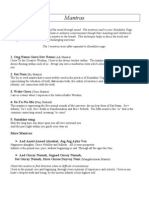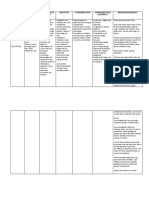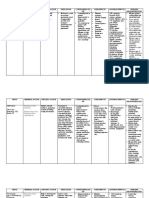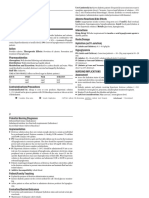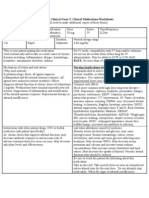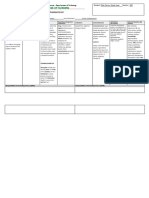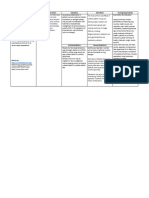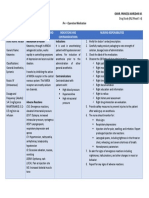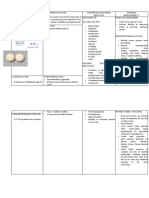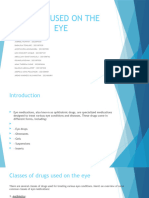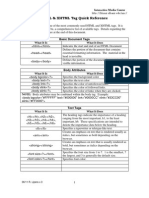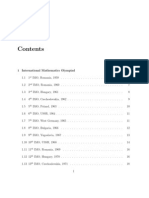INDOMETHACIN
INDOMETHACIN
Uploaded by
RPh Krishna Chandra JagritCopyright:
Available Formats
INDOMETHACIN
INDOMETHACIN
Uploaded by
RPh Krishna Chandra JagritCopyright
Available Formats
Share this document
Did you find this document useful?
Is this content inappropriate?
Copyright:
Available Formats
INDOMETHACIN
INDOMETHACIN
Uploaded by
RPh Krishna Chandra JagritCopyright:
Available Formats
Drug name General details
INDOMETHACIN
Drug class NSAID COX inhibitor Trade names Artracin, Flexin, Imbrilon, Indoflex, Indoloar, Indomax, Indomod, Mobilan, Rheumacin, Rimacid Availability OTC 5 - 10 hours
Indomethacin is an NSAID, first introduced in the early 1960s and can have serious side effects. It is used for inflammatory conditions including, rheumatoid and osteoarthritis, ankylosing spondylosis, gout, bursitis and tendonitis. It is more potent than ibuprofen or aspirin and only needs to be taken twice daily. It has more side effects, including gastric irritation and bleeding.
How taken Capsules Liquid Suppositories Injection Side effects Symptom Nausea/vomiting Gastric pain Diarrhoea Indigestion Dizziness Headache Wheezing Rash Blurred vision Depression Other drug interactions
Dosage 50 - 200 mg/ day
Duration of action
considerations Occurrence Common Common Common Common Common Common Rare Rare Rare Rare Patients may have skin reactions to NSAIDs, such as rashes. This will make treating the patient difficult. Mobilisation techniques would be better suited if the patient is taking anticoagulents in conjunction with Indomethacin. Dietary advice No specific dietary advice Special precautions Patients taking anti-coagulant drugs should be advised not to take this drug as it may increase the anti-coagulant effect.
Interactions with drugs including anticoagulants and corticosteroids. Increased risk of bleeding, bruising and the development of gastric ulcers.
You might also like
- Krav Maga Pressure Points - Military Hand To Hand Combat GuideDocument27 pagesKrav Maga Pressure Points - Military Hand To Hand Combat Guidebrogan98% (135)
- 6th Central Pay Commission Salary CalculatorDocument15 pages6th Central Pay Commission Salary Calculatorrakhonde100% (436)
- Mantras - English - KundaliniDocument7 pagesMantras - English - KundaliniRPh Krishna Chandra JagritNo ratings yet
- KetoconazoleDocument2 pagesKetoconazoleMD. DELWAR HOSSAINNo ratings yet
- INDOMETACINDocument5 pagesINDOMETACINteslimolakunlerajiNo ratings yet
- Aspirin: Generic NameDocument4 pagesAspirin: Generic NameGwww BabababaNo ratings yet
- Brand Name: Chloromycetin Generic Name: Chloramphenicol Indication: External Ear CanalDocument2 pagesBrand Name: Chloromycetin Generic Name: Chloramphenicol Indication: External Ear CanalianecunarNo ratings yet
- Drug Study On Gastrointestinal AgentsDocument18 pagesDrug Study On Gastrointestinal AgentsJenica ManuntagNo ratings yet
- BeclomethasoneDocument2 pagesBeclomethasoneDiane Bonita HerreraNo ratings yet
- CEFOTAXIMEDocument3 pagesCEFOTAXIMEChoox PriiNo ratings yet
- Drug Study DiazepamDocument2 pagesDrug Study DiazepamBunnie AlphaNo ratings yet
- Drug Study: NCM 106 Pharmacology: Patient MonitoringDocument2 pagesDrug Study: NCM 106 Pharmacology: Patient Monitoringpoleene de leonNo ratings yet
- Drug Study: AmoxicillinDocument3 pagesDrug Study: AmoxicillinKrzia TehNo ratings yet
- Furosemide ChlorthalidoneDocument5 pagesFurosemide ChlorthalidoneLIEZEL GRACE VELAYONo ratings yet
- PiroxicamDocument2 pagesPiroxicamVirginia Aira Lara MarquezNo ratings yet
- Drug Study MixDocument29 pagesDrug Study MixMatty JolbitadoNo ratings yet
- Drug StudyDocument2 pagesDrug StudyZeeham EscalonaNo ratings yet
- DigoxinDocument4 pagesDigoxinJaessa FelicianoNo ratings yet
- ZafirlukastDocument3 pagesZafirlukastapi-379794167% (3)
- LamivudineDocument2 pagesLamivudineRosher Deliman JanoyanNo ratings yet
- DextroseDocument2 pagesDextroseSanket TelangNo ratings yet
- Drug Study: Notre Dame of Tacurong CollegeDocument2 pagesDrug Study: Notre Dame of Tacurong CollegeApol PenNo ratings yet
- Dextromethorphan HydrobromideDocument2 pagesDextromethorphan Hydrobromideapi-3797941No ratings yet
- Carbocisteine Drug StudyDocument3 pagesCarbocisteine Drug StudyEd King CubalanNo ratings yet
- Drug Name Mechanism of Action Indication/Contraindication Adverse Effect Nursing Responsibilities: GenericDocument2 pagesDrug Name Mechanism of Action Indication/Contraindication Adverse Effect Nursing Responsibilities: GenericArian May MarcosNo ratings yet
- Generic Name: Classification: Indication:: Candida InfectionsDocument1 pageGeneric Name: Classification: Indication:: Candida Infectionscen janber cabrillos0% (1)
- Amoxicillin Tri Hydrate Table FormatDocument3 pagesAmoxicillin Tri Hydrate Table FormatNico DonatoNo ratings yet
- HYDROXYZINE DIHCL (Iterax)Document1 pageHYDROXYZINE DIHCL (Iterax)Rye Anch100% (1)
- PrednisoloneDocument2 pagesPrednisoloneKatie McPeekNo ratings yet
- Chlorthalidone HygrotonDocument2 pagesChlorthalidone HygrotonLIEZEL GRACE VELAYONo ratings yet
- Drug Study AspirinDocument1 pageDrug Study AspirinMaria Charis Anne Indanan100% (1)
- Drug Study On EPINEPHRINEDocument6 pagesDrug Study On EPINEPHRINEshadow gonzalezNo ratings yet
- College of Nursing: Rifadin RifampinDocument4 pagesCollege of Nursing: Rifadin RifampinAnika PleñosNo ratings yet
- Tamsulosin - Drug Information - UpToDateDocument23 pagesTamsulosin - Drug Information - UpToDateGénesis GabrielaNo ratings yet
- Leoprolide Drug StudyDocument2 pagesLeoprolide Drug Studyhappymee927No ratings yet
- Name of Drug Mechanism of Action Indications and Contraindication Adverse Effect Nursing ConsiderationDocument2 pagesName of Drug Mechanism of Action Indications and Contraindication Adverse Effect Nursing ConsiderationNicole CalpoturaNo ratings yet
- Drug Study MethergineDocument2 pagesDrug Study MethergineJahmil DulatreNo ratings yet
- Name of Drug Dosage/Frequency/ Timing/Route Mechanism of Action Indication Contraindication Adverse Effect Nursing ResponsibilitiesDocument2 pagesName of Drug Dosage/Frequency/ Timing/Route Mechanism of Action Indication Contraindication Adverse Effect Nursing ResponsibilitieskyleNo ratings yet
- Hydroxy ZineDocument2 pagesHydroxy ZineSharmaine Grace FlorigNo ratings yet
- Drug Card TamifluDocument1 pageDrug Card TamifluAdrianne BazoNo ratings yet
- Med 3 Drug StudyDocument12 pagesMed 3 Drug StudyJinky Nacar DomingoNo ratings yet
- Name: Micaela Andrea C. Cielo Date: Year & Section: BS Nursing 2A Drug Study: AlbendazoleDocument2 pagesName: Micaela Andrea C. Cielo Date: Year & Section: BS Nursing 2A Drug Study: AlbendazoleMicaela Andrea CieloNo ratings yet
- Ditropan Drug CardDocument2 pagesDitropan Drug CardBenNo ratings yet
- Drug Study (Pe)Document15 pagesDrug Study (Pe)Jobelle AcenaNo ratings yet
- Ertapenem (Invanz)Document1 pageErtapenem (Invanz)Adrianne Bazo100% (1)
- MetamucilDocument1 pageMetamucilSheri490No ratings yet
- Doxazosin MesylateDocument2 pagesDoxazosin Mesylateapi-3797941100% (1)
- Beractant: Drug Class Therapeutic ActionsDocument4 pagesBeractant: Drug Class Therapeutic ActionsPrincess BartolomeNo ratings yet
- DORMICUMDocument1 pageDORMICUMArian Rose100% (1)
- Drug Study SpironolactoneDocument2 pagesDrug Study SpironolactoneAina HaravataNo ratings yet
- Nepafenac Drug StudyDocument3 pagesNepafenac Drug StudyLucky Rius0% (1)
- Drug StudyDocument1 pageDrug StudyPRINCESS MARIZHAR OMARNo ratings yet
- MifepristoneDocument1 pageMifepristonejennierubyjane kimNo ratings yet
- DRUG STUDY (Diethystilbestrol)Document2 pagesDRUG STUDY (Diethystilbestrol)Avianna CalliopeNo ratings yet
- GLYBURIDEDocument2 pagesGLYBURIDEanne marieNo ratings yet
- Drug Study AripiprazoleDocument3 pagesDrug Study AripiprazoleLEA MAE POSUGACNo ratings yet
- What Is Tonsillitis?: City of Malolos, BulacanDocument7 pagesWhat Is Tonsillitis?: City of Malolos, BulacanElijah AmbeguiaNo ratings yet
- GuaifenesinDocument2 pagesGuaifenesinapi-379794150% (2)
- Drug Study QIDocument8 pagesDrug Study QImaeDonitaNo ratings yet
- HYOSCINEDocument1 pageHYOSCINEzyr2189No ratings yet
- Rednisolone Rednisone: Atient Nformation OnDocument4 pagesRednisolone Rednisone: Atient Nformation OnYoona LuNo ratings yet
- Drugs Used On The EyeDocument10 pagesDrugs Used On The EyedoyinsolaolusanyaNo ratings yet
- Anti Inflammatory DrugsDocument15 pagesAnti Inflammatory Drugsaamer niaziNo ratings yet
- About MeningiomaDocument5 pagesAbout MeningiomaRPh Krishna Chandra JagritNo ratings yet
- HTML-XHTML Tag SheDocument6 pagesHTML-XHTML Tag SheabcjohnNo ratings yet
- Matrimonial Resume CVDocument3 pagesMatrimonial Resume CVRPh Krishna Chandra Jagrit76% (37)
- Matrimonial Resume CVDocument3 pagesMatrimonial Resume CVRPh Krishna Chandra Jagrit76% (37)
- MantrasDocument24 pagesMantrasg_gaurishankar@rediffmail.com100% (6)
- Matrimonial Resume CVDocument3 pagesMatrimonial Resume CVRPh Krishna Chandra Jagrit76% (37)
- About This Tutorial: Version HistoryDocument328 pagesAbout This Tutorial: Version HistoryKate CorralesNo ratings yet
- Martial Arts - Bruce Lee's Training SecretsDocument3 pagesMartial Arts - Bruce Lee's Training Secretsbrogan91% (34)
- Web DesigningDocument638 pagesWeb DesigningRPh Krishna Chandra JagritNo ratings yet
- Super Fast Mental Math - Vedic Math HistoryDocument51 pagesSuper Fast Mental Math - Vedic Math Historyvedicmath98% (43)
- Tally 9.2 NotesDocument1,918 pagesTally 9.2 NotesRamesh80% (5)
- Martial Arts - Bruce Lee's Speed TrainingDocument4 pagesMartial Arts - Bruce Lee's Speed Trainingbrogan97% (33)
- Niper Model Paper 6.Document37 pagesNiper Model Paper 6.GANESH KUMAR JELLANo ratings yet
- Curriculum VitaeDocument2 pagesCurriculum VitaeRPh Krishna Chandra JagritNo ratings yet
- Math Olympiad Problems Collection-V1Document97 pagesMath Olympiad Problems Collection-V1RPh Krishna Chandra Jagrit100% (1)
- Introduction in Human AnatomyDocument60 pagesIntroduction in Human AnatomyRPh Krishna Chandra JagritNo ratings yet
- Medicinal PlantsDocument29 pagesMedicinal PlantsGANESH KUMAR JELLANo ratings yet
- General Pharmacology MCQDocument6 pagesGeneral Pharmacology MCQShrikant ThakurNo ratings yet
- General KnowledgeDocument141 pagesGeneral KnowledgeRAVI KUMAR83% (12)


